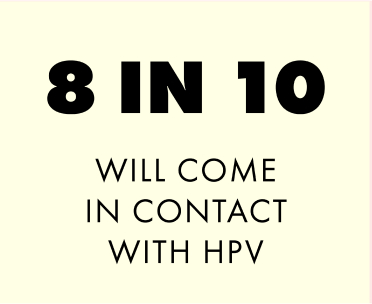July 2025 5 MIN READ
Sharing Key Facts and Debunking Women’s Health Myths
To help continue our mission of looking after women from top to bottom, we have teamed up with our partnered charities CoppaFeel! and The Eve Appeal to help debunk some myths around breast cancer, along with sharing key facts around HPV and cervical screening.
Breast Cancer Can Affect Any Body
Many people think that breast cancer is something that only affects older women of mammogram age, but CoppaFeel! is here to educate and empower everyone to be aware of the signs and symptoms and get to know their bodies.
There are a lot of misconceptions about breast cancer, so let’s dive in!
“As a young person, breast cancer would never affect me!”’.In females aged 25-49, breast cancer is the most common cancer, accounting for more than 4 in 10 (44%) of all cases in 2014-2016, so whilst being diagnosed when you are younger is rare, it is always worth being aware of your chest and regularly checking.
“Breast Cancer signs can only be seen or felt in the breasts/pecs area.” When we say check your breasts, chests, pecs, we mean the area from your ribs up to your collarbone and armpits, including your nipples. You might prefer to call your chest something else, and that’s ok!
“If I find something whilst I am checking, it will be cancer.” If you go to the doctor because you are worried about something that isn’t normal for you, in 90% of cases, it won’t lead to a breast cancer diagnosis.
“Most breast cancer cases are genetic.” Whilst you might hear of breast cancer being caused by a mutation of the BRCA gene, in fact fewer than 1 in 100 breast cancers are caused by this. If you’re concerned about the BRCA gene and getting tested, there is more information on CoppaFeel!’s website here.
“If I have mammograms, I don’t need to check my chest.” Even if you go for your regular mammograms when you are called up for them (for most people that’s when you’re over the age of 50), it’s still really important to check regularly yourself so you can monitor what’s normal for you. Read more about breast screening on CoppaFeel!’s website here.
“My lifestyle can reduce my risk of breast cancer.” There are lots of things we can do to keep healthy and reduce our risk of all cancers. These include drinking lots of water, exercising, cutting back on alcohol, stopping smoking and eating a balanced diet. And of course, getting to know your chest! For more detailed information about how lifestyle factors affect your risk of breast cancer, Cancer Research UK has more information here.
Common Breast Cancer Myths Considered
There is a lot of information out there about breast cancer, and everyone’s experience and diagnosis is different. Some headlines in the news about breast cancer can be scary and they are not always accurate, so CoppaFeel!’s website has a section that busts a few common breast cancer myths.
- Deodorant: there is no evidence that deodorant causes breast cancer. Whatever deodorant you use, it will not increase your risk of breast cancer.
- Mobile phones: Mobile phones are relatively new, so there is no long term evidence about their lasting effects. However, the best research says that mobile phones do not cause cancer. The radio waves from mobile phones in the UK are too weak to cause cancer. 4G and 5G transmit radio waves too, but they are also too weak to cause cancer. CoppaFeel! recommends you do not keep your phone in your bra, but only for your own comfort!
- Bras: Wearing an underwired bra will not increase your risk of breast cancer. Wearing the wrong size bra will not increase your risk of breast cancer. Wearing a bra is a choice. It’s up to you what you wear. If you choose to wear a bra, you will be more comfortable in a bra that fits well. Your choice either way will not increase your risk of breast cancer.
- Breast implants: There are risks involved with all surgery, and there are risks involved with all implants (prosthesis). However, there is no evidence that breast implants increase your risk of breast cancer. If you have breast implants, you should be checking your chest regularly.
CoppaFeel! Are Here to Help
CoppaFeel! can help with any more questions you might have around breast cancer, how to check and all things early detection (it really can save lives.) Head to their health information pages on coppafeel.org or visit their award winning Self-Checkout tool at self-checkout.coppafeel.org.
Let's Share the Facts & Answer Some Cervical Screening and HPV Questions
What is HPV?
HPV is a common virus that’s spread through skin-to-skin sexual contact. 8 in 10 of us will get HPV at some point in our lives. Our immune system usually clears it within two years without it causing any problems.
There are over 200 different strains of HPV, which are split up into two groups, low-risk and high-risk HPV. If HPV doesn’t clear, low-risk types can go on to develop into warts and verrucas, and high-risk types can go on to develop into certain types of cancer: head and neck, anal, cervical, vulval, vaginal and penile cancers. High-risk HPV is linked to nearly all cervical cancers. To help prevent cervical cancer in the UK we have HPV vaccination and cervical screening programmes.
HPV vaccination
The HPV vaccine (jab) is a safe and effective way to protect against some types of HPV. This helps prevent genital warts and HPV-related cancers. The vaccine now offered in schools is called Gardasil 9. It protects against 9 strains of HPV.
The HPV vaccine is offered free in schools to young people in year 8, aged 12-13. If you missed out on the vaccine at school, you can still get it for free until you are 25. You can get it from your GP surgery. If you’re thought to be at a higher risk, you are eligible up until 45. You can get the vaccination at sexual health clinics. Groups that are thought to be at higher risk include:
Some people make playlists or listen to their favourite audiobook or podcasts to help them relax.
- men who have sex with men
- trans people
-people who are immunocompromised (which may be because they are on long-term immunosuppressants or have HIV).
The vaccine is also available privately up until the age of 45.
Cervical Screening Information
A cervical screening (which used to be called a smear test) is a free health test on the NHS to help prevent cervical cancer. It checks for a virus called high-risk HPV. If high-risk HPV is present, then the sample will be checked for cervical cell changes. These changes are not cancer. They will be monitored or treated to prevent cancer from developing. It is not a test to diagnose cervical cancer.
Cervical screening is estimated to save around 5,000 lives a year from cervical cancer in the UK which is why attending cervical screening is so important – as it can help stop cancer before it starts.
Facts about HPV and Cervical Screenings
Fact: Cervical screening is important, whether or not you have had the HPV vaccine. The HPV vaccine protects against some, but not all strains of high-risk HPV, so it is still important to go for screening, even if you have had the vaccine.
Fact: Condoms reduce your risk of HPV, but not completely. HPV is transmitted through skin-to-skin sexual contact, and not bodily fluids like other STIs. This includes sexual touch, oral, vaginal, anal sex, and sharing sex toys. Condoms can help reduce your risk, but they don’t protect against it fully. This is because some skin will still be touching. You can’t get HPV from hugging, sharing baths or towels, from swimming pools, toilet seats or from sharing cups, plates or cutlery.
Fact: You can have HPV even if you haven’t had penetrative sex. ‘Having sex’ can mean different things to different people. You can get HPV from any form of sexual contact. If you have never had any form of sexual contact, then you are at a lower risk of cervical cancer. It is still important to attend your cervical screening when invited.
Fact: You still need cervical screening if you are a woman who only has sex with women. HPV is transmitted by skin-to-skin contact. It can be anywhere, such as your fingers and mouth. You can get HPV from just one sexual experience. You do not need to have had penetrative sex to get HPV.
Fact: You can get HPV from just one sexual experience. HPV does not care about your sexual history. Having sex with multiple partners may increase the likelihood of coming across HPV, but transmission of HPV only takes one sexual experience, if your sexual partner has HPV. HPV does not have symptoms, and can take many years to progress into cell changes or cancer. So, people can have it without even knowing, and it's almost impossible to tell when you got HPV or who from.
Frequently Asked Questions About Cervical Screenings
Will cervical screening hurt?
Some people find cervical screening uncomfortable, but it shouldn’t be painful. Some health conditions may make screening more uncomfortable, or even painful. These include endometriosis, vaginismus, vulvodynia, and being menopausal. If you have a health condition that makes cervical screening painful, tell your GP. There are a few things they can do to make you feel more comfortable, like using a smaller speculum, bringing a friend or playing music. The Eve Appeal has put together useful tips to help make your cervical screening appointment more comfortable.
I am on my period, can I still go for my screening test?
Try to book your cervical screening for when you are not on your period. Menstrual blood can make it difficult to get an accurate result. If you are due your period when your test is booked, get in touch with your GP surgery to change the appointment.
Should I go for cervical screening if I am pregnant?
It is usually recommended that you do not have cervical screening while you are or could be pregnant. Pregnancy can affect the results of your test.
If you are invited for cervical screening while pregnant, tell your healthcare professional that you are pregnant. You should wait until three months after your pregnancy ends before having a cervical screening test.
If you need follow-up after an abnormal cervical screening result, or treatment for cell changes, you may need to have the test while pregnant. Your colposcopy team will chat to you about your options.
More Information on HPV and Cervical Screenings
The Eve Appeal has a lot more information on HPV, cervical screening and tips on how to make the appointment easier at eveappeal.org.uk/screening. You can also speak to one of their Ask Eve Nurses for free and confidential information and support.







































